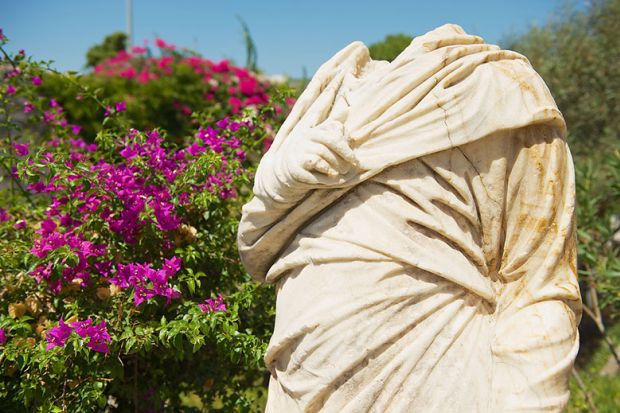The US and UK have both fallen in a global academic freedom ranking, with a 2022 stocktake showing continued declines in basic freedoms and how security impacts on campus life.
The 2022 Academic Freedom Index (AFI) is based on reports from more than 2,000 scholars who chalk up changes across five areas: the freedom to research and teach; the freedom of academic exchange; institutional autonomy; campus integrity; and the freedom of academic and cultural expression.
The US and UK are among 22 countries that saw “significant declines” across the indicators between 2012 and 2022, with major drops also seen in Egypt, Turkey, India and China. In 2022, the biggest decline in the US was in the freedom to research and teach, while for the UK it was in campus integrity.
In the US, the index picked up state-level changes like bills that ban the teaching of concepts related to critical race theory, the erosion of tenure and university moves to restrict staff rights to testify against their state. In the UK, 2021-22 declines were in “campus integrity” – an indicator of how free campuses are from politically motivated surveillance or security infringements – the value of which fell from 3.2 to 3, down from 3.6 in 2012.
Worldwide, the 2022 edition of the index – which runs from 0 to 1 – found academic freedoms were in retreat for over 50 per cent of the world’s population, about 4 billion people. Covid-19 restrictions in China, growing autocracy in India and Russia’s invasion of Ukraine were all contributors to the fall.
“We saw troubling changes in India and China, but the declines in the freedom to research and teach and institutional academic freedom in the US and UK show that academic freedom needs not only to be protected by governments, but also by society and researchers – also in countries seen as academic powerhouses,” Lars Pelke, one of the index’s authors and a postdoctoral researcher at the University of Erlangen-Nuremberg, told Times Higher Education.
Dr Pelke said the declines in Russia and Ukraine were both driven in part by the former’s invasion of the latter. “It’s a war effect,” he said, referring to Ukraine’s drop in the index from 0.54 in 2021 to 0.39 in 2022, although noting the latter figure was relatively high for a country at war. Globally, Russia sits in the second-lowest decile of countries, with Ukraine in the third lowest.
Across the world, the index finds longer-term changes linked to politically diverse but increasingly autocratic national leaders, who often exacerbate clampdowns that began before they took office.
Narendra Modi’s Hindu nationalist government has centralised university governance and introduced more red tape to a system that already had weak legal defences for institutional autonomy, with individual expression also taking a hit. In Mexico, a left-wing populist government led by Andrés Manuel López Obrador has clipped freedoms that were declining across all five indicators, appointing university directors, imposing austerity and steering research towards its political priorities.
The fourth edition of the AFI weighs its five indicators based on the uncertainties in their measurement, with the global average also weighted by population. Although the self-reported expert ratings of the realities of academic freedom carry large margins of error, the authors said that global freedoms have fallen to levels not seen since the early 1980s, after peaking around 2008.
While the number of countries with significant declines rose from 19 to 22 between 2021 and 2022, and now includes China, Dr Pelke sought thin rays of hope in the number of countries showing significant improvements, which rose from two to five. He did however acknowledge that the Gambia, Uzbekistan, the Seychelles, Montenegro and Kazakhstan make up less than 1 per cent of the global population, and are coming from relatively low baselines.
Register to continue
Why register?
- Registration is free and only takes a moment
- Once registered, you can read 3 articles a month
- Sign up for our newsletter
Subscribe
Or subscribe for unlimited access to:
- Unlimited access to news, views, insights & reviews
- Digital editions
- Digital access to THE’s university and college rankings analysis
Already registered or a current subscriber? Login









